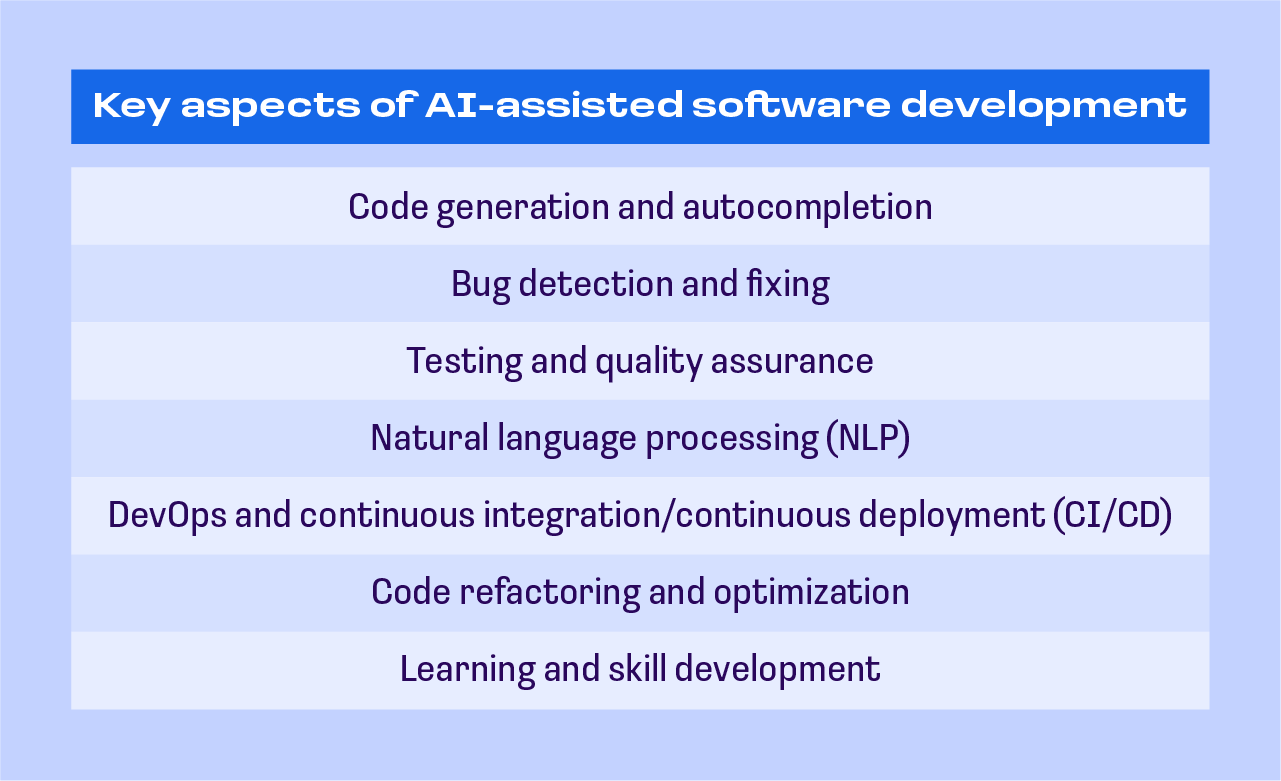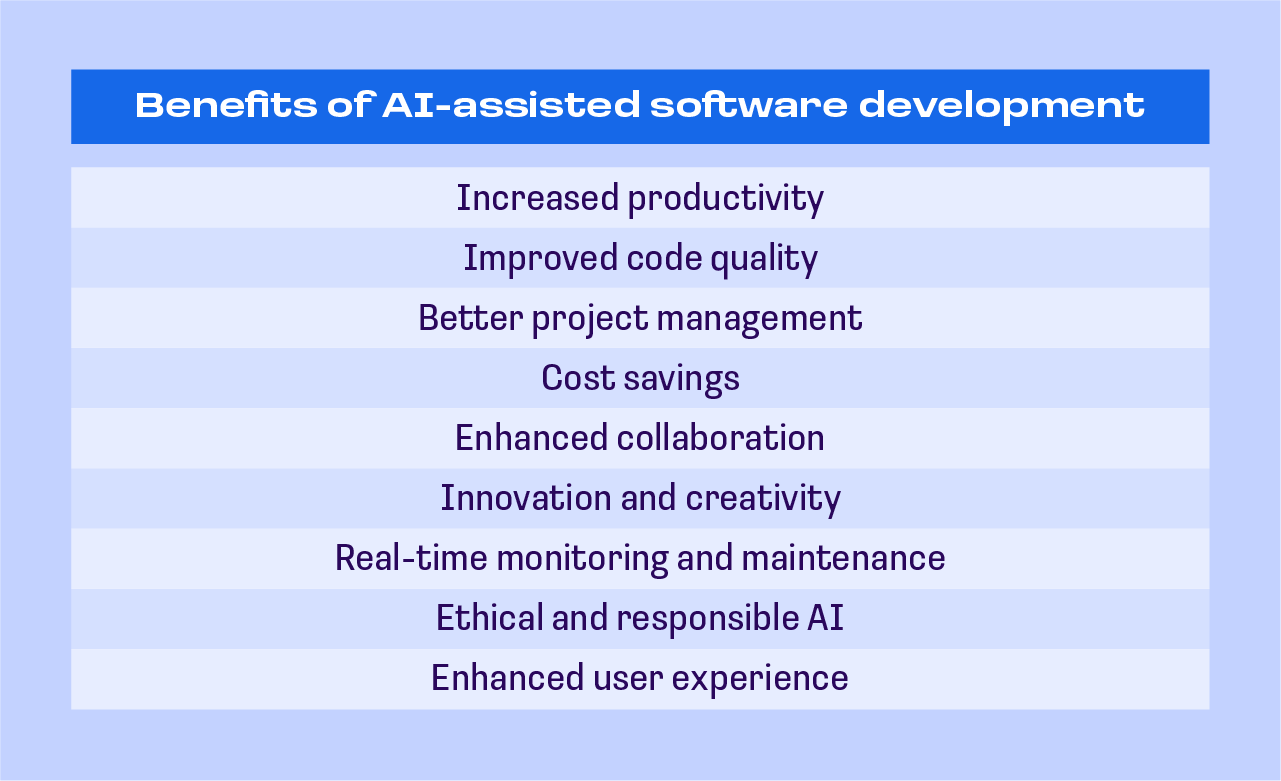AI-assisted software development explanation and examples of use
The author of this article is tech expert Pieter Murphy. Invited expert — Vitali Vishneuski, Delivery Manager, EngX Expert.

Now that we have AI tools for all kinds of uses, including text, image, code, and even video generation, it has become the norm for many software development tools to incorporate AI capabilities into the process.
AI-assisted software development aims to streamline the development process, problem-solving, and spur innovation. It is also being touted as a great way to achieve more developmentally with the allotted resources.
While AI-assisted software development surely optimizes various aspects of software development, it’s still the definition of “unreliable,” as it picks up biases or hallucinates. It may be impressive, but it is yet to prove it can fully replace the ingenuity of human developers.
What is AI-assisted software development?
AI-assisted development involves integrating artificial intelligence (AI) tools and techniques into the software development process.
This integration leverages machine learning models and AI algorithms for project management, performance optimization, natural language understanding, code suggestions, automated testing, and code analysis.
Key aspects of AI-assisted software development
AI-assisted software development is a rapidly evolving field that leverages artificial intelligence to enhance various aspects of the software development lifecycle. Here are some key aspects:
Code generation and autocompletion
- Intelligent code suggestions: Tools like GitHub Copilot use machine learning models to provide real-time AI-assisted coding suggestions, significantly speeding up the coding process.
- Template generation: AI can generate boilerplate code, allowing developers to focus on more complex and unique aspects of their projects.
Bug detection and fixing
- Static analysis: AI-driven static analysis tools can identify potential bugs, security vulnerabilities, and code smells by analyzing the codebase.
- Automated debugging: AI can assist in diagnosing and fixing bugs by suggesting potential fixes based on historical data and patterns.
Testing and quality assurance
- Automated test generation: AI can automatically generate unit tests, integration tests, and end-to-end tests, ensuring comprehensive test coverage.
- Test optimization: AI can prioritize and optimize test cases to focus on the most critical parts of the application, reducing the time and resources required for testing.
Natural language processing (NLP)
- Requirement analysis: AI can analyze and interpret natural language requirements, converting them into technical specifications or even initial code structures.
- Documentation: AI can generate and maintain documentation by understanding code changes and updates, ensuring that documentation is always up-to-date.
DevOps and continuous integration/continuous deployment (CI/CD)
- Automated deployment: AI can manage and optimize deployment pipelines, ensuring smooth and efficient releases.
- Monitoring and anomaly detection: AI can monitor system performance and detect anomalies in real time, enabling proactive issue resolution.
Code refactoring and optimization
- Performance optimization: AI can analyze code for performance bottlenecks and suggest optimizations.
- Code refactoring: AI can automatically refactor code to improve readability, maintainability, and adherence to coding standards.
Learning and skill development
- Personalized learning: AI can provide personalized learning paths and resources based on a developer’s current skills and progress. Developers can sometimes get stuck during application development, necessitating quick and efficient learning with AI-assisted programming tools.
- Code reviews and feedback: AI can assist in code reviews by providing constructive feedback and highlighting areas for improvement.

AI-assisted software development aims to enhance productivity, improve code quality, and streamline the development process. However, it’s essential for developers to stay informed about the limitations and ethical considerations of AI-assisted coding.
Essentially, AI acts as a virtual assistant with an expansive and near-perfect memory, used in the form of specialized tools to shorten the time it takes to conduct certain time-consuming, automatable, and/or monotonous tasks.
It enforces best practices while enabling teams to meet production schedules. Are you wondering what specific problems in programming require you to use AI to solve them?
Well, you should “learn solution/language/technology; explain requirements, break and plan development tasks; find and brainstorm solutions; develop; create unit tests; refactoring; troubleshooting; code review; documentation; etc.” according to Vitali Vishneuski, Delivery Manager, EngX Expert.
Benefits of AI-assisted software development
In examining this topic, the question inevitably comes up: how will AI change software development? To understand that, let’s start by looking at the benefits it promises:
Increased productivity
- Faster code writing: AI-assisted programming leverages tools to generate code snippets, complete code, and suggest improvements, allowing developers to complete rote or monotonous tasks more quickly.
- Automated repetitive tasks: You can automate routine (often monotonous) tasks. For example, code formatting, refactoring, and generating boilerplate code can be automated, freeing up developers to focus on more complex issues.
Improved code quality
- Error detection: AI can identify potential bugs, security vulnerabilities, and code smells early in the development process, leading to more robust and secure code.
- Consistent coding standards: AI tools can enforce coding standards and best practices, ensuring a consistent codebase.
Better project management
- Task automation: AI can automate project management tasks like task assignment, progress tracking, and status updates, making project management more efficient.
- Risk prediction: AI can analyze historical data to predict potential risks and bottlenecks, enabling proactive management.
Cost savings
- Reduced development time: By automating many aspects of the development process, AI helps reduce the overall time required to develop software, leading to cost savings.
- Optimized resource allocation: AI can help in better resource planning and utilization, reducing wastage and improving efficiency.
Enhanced collaboration
- Improved communication: AI-powered chatbots and virtual assistants can facilitate better communication among team members, providing instant answers to queries and ensuring everyone is on the same page.
- Knowledge sharing: AI can help manage and retrieve knowledge from large codebases, documentation, and websites, making it easier for team members to access relevant information.
Innovation and creativity
- Idea generation: AI can assist in brainstorming and generating new ideas, providing different perspectives and solutions.
- Exploration of alternatives: AI can suggest multiple ways to solve a problem, allowing developers to explore various approaches and choose the best one.
Real-time monitoring and maintenance
- Anomaly detection: AI can continuously monitor system performance and detect anomalies in real-time, enabling proactive maintenance.
- Predictive maintenance: AI can predict potential system failures and suggest preventive measures, reducing downtime.
Ethical and responsible AI
- Bias detection: AI can help identify and mitigate biases in code and algorithms, promoting fairness and inclusivity.
- Ethical guidelines: AI can assist in ensuring that software development adheres to ethical guidelines and industry standards.
Enhanced user experience
- User behavior analysis: AI can analyze user behavior and feedback to suggest improvements in the software and websites, leading to a better user experience.
- Personalized features: AI can help in creating personalized features and functionalities for software and websites based on user preferences and behavior.

In summary, AI-assisted software development offers a wide range of benefits that can lead to more efficient, high-quality, and innovative software solutions. However, it’s essential to use these tools responsibly, considering machine learning ethical issues and potential limitations.
A consequence of this new technology has come down to figuring out how to boost your productivity with AI tools.
So, what types of development tasks became much easier to solve when it became possible to use Artificial Intelligence? “Everything. But you must understand that AI doesn’t add effort to your work; it multiplies your efforts. You get as much performance increase as you apply your skills. You have to control and integrate the output of AI tools. Read your code.” answers Vitali V.
The future of AI-assisted software engineering
The future of AI-assisted software engineering is set to be transformative, significantly enhancing productivity, quality, and innovation. AI will enable more advanced code generation, making it easier to convert natural language descriptions into functional code.
Collaboration tools will become smarter, facilitating real-time feedback and virtual pair programming. Project management will be more efficient with AI handling task assignments, resource management, and risk predictions.
Testing and quality assurance will see improvements through self-healing code and continuous testing. DevOps processes will be further automated, optimizing CI/CD pipelines and real-time performance monitoring.
Personalized developer experiences will be tailored through adaptive learning and customizable development environments. Ethical considerations will be better managed with AI-driven bias mitigation and compliance enforcement.
As the technologies come into focus, we see AI myths unraveling. The prevalent fear is that AI could replace our future workforce and that even jobs that require constant learning and years of experience, such as software developers, are at risk.
However, AI’s limitations mean it continues to be seen as a ’helper’ or ’speed booster’ and not so much a replacement for highly skilled and creative humans.
AI will foster innovation through generative design and exploratory programming, and it will integrate seamlessly with emerging technologies like quantum computing and IoT. Overall, AI will augment human capabilities, making software development more accessible and inclusive while ensuring high standards of security and compliance.
If you want to know whether experienced programmers or novices are more likely to use AI in software development, Vitali V. responds, “I highly recommend experienced programmers use AI tools in any mode whether it’s code completion or chat. I recommend novices use AI tools attentively and prefer chat mode for learning, searching and brainstorming.”
Learn about the effective use of AI for software development in courses from EngX
The major objective of the Engineering Excellence, or EngX, program, which was established in 2014, is to give EPAM’s software engineers the resources, equipment, and services they require to improve the quality of their software development.
At the moment, EngX is a tried-and-true program that encourages optimal engineering practices across EPAM.
If you want to learn more about the effective use of AI in software engineering for both applications and websites, consider signing up for the AI-Supported Software Engineering course from EngX. With the course, you will gain more knowledge on:
- LLM basics;
- Development tasks;
- GitHub Copilot and ChatGPT;
- Project documentation;
- Prompt engineering and
- Development testing.
Do you wonder for whom it will be relevant to improve their knowledge of the use of AI in software development? “It is a new trending approach in software development, and not many developers are familiar with it. From this perspective, I think this course might be relevant for all engineers who want to remain in demand and increase their productivity.” Vitali Vishneuski, Delivery Manager, EngX.
Learn how to adopt generative AI for software engineers on the EngX’s training for corporate teams and independent groups.


.png)
